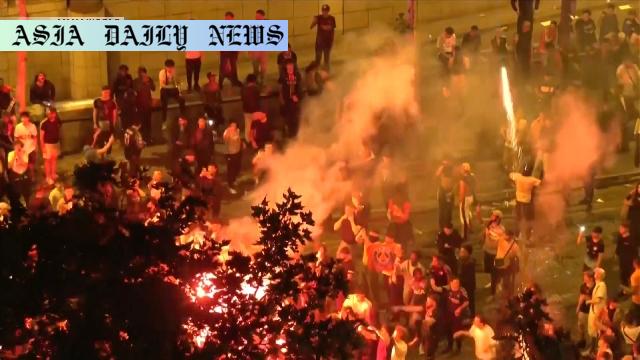Paris celebrates PSG’s UEFA Champions League triumph, but clashes escalate between fans, with over 300 detained as chaos erupts.
Paris saw celebrations turn chaotic after PSG’s UEFA Champions League victory.
Police detained 300 people; fires and damages were reported.
Shops were looted and 5,400 officers were mobilized.

Historic Parisian Celebration Turns Violent
In a historic first for Paris Saint-Germain (PSG), the French soccer club secured their UEFA Champions League victory in a stunning 5-0 win against Inter Milan. While the match itself unfolded smoothly in Munich, Germany, the post-match celebrations in Paris turned violent. On Saturday evening, as fans flooded the streets to commemorate their team’s success, chaos erupted in what should have been a purely joyous occasion.
The famed Champs-Elysees became the epicenter of unrest. Fires lit up the streets, with some individuals setting cars ablaze while others looted shops. What began as an expression of euphoria soon spiraled out of control. French law enforcement was quick to intervene, deploying more than 5,400 officers and personnel to contain the escalating violence. Tear gas was employed to disperse unruly crowds that had begun advancing on key areas of the city.
Clashes Between Fans and Authorities
This wasn’t the first instance of tensions between Parisian fans and authorities during this tournament. Earlier clashes followed PSG’s semifinal victory, prompting increased security measures. However, despite these precautions, the championship celebrations nearly mirrored the previous confrontations. French media, including AFP, reported widespread property damage. Beyond the open flames and flares, multiple vehicles and storefronts suffered irreparable harm. The grim tally included the detention of approximately 300 individuals accused of taking part in reckless and violent acts.
The Strain on Security Forces and Public Sentiment
The events cast a shadow over what should have been a proud moment for Paris and French soccer. Local residents have expressed disappointment and concern about the destructiveness that followed the joyous occasion. Even authorities have pointed to the complexity of logistical planning required to balance celebratory freedom and public safety. The preexisting tensions, likely fueled by months of pandemic-related strain, seem to have found an outlet in the form of post-match riots. This unfortunate situation emphasizes the need for holistic, community-focused approaches to managing large public gatherings, especially during sensitive times.
While Paris basks in the glory of PSG’s triumph, the aftermath of the celebration serves as a sobering reminder of social unrest. As the city counts the costs—both financial and emotional—the hope remains that such events can be better mitigated in the future.
Commentary
The Duality of Parisian Jubilation
Paris Saint-Germain’s historic victory in the UEFA Champions League is undoubtedly a milestone in French soccer history. For loyal fans, this win signifies years of dedication, passion, and teamwork finally bearing fruit. As a city celebrated with fervor, it was heartwarming to witness a community come together in collective joy.
However, what unfolded on the streets paints a stark contrast to the unity seen inside the stadium. The post-match chaos reveals underlying issues that extend beyond sports. In a city accustomed to hosting massive events, it is alarming to witness celebrations devolve into violence and destruction. Such incidents tarnish the reputation of genuine supporters and overshadow the positive spirit of the occasion.
Reflections on Public Behavior
The unruly actions of a select few fans have the power to ruin the experience for everyone. It raises critical questions about accountability, social responsibility, and the role of sports in uniting or dividing communities. While the authorities and law enforcement are expected to restore order, public cooperation and respect are equally vital in ensuring peaceful celebrations. Addressing this cyclical pattern of unrest may involve deeper community engagement, stricter policing, and fostering a broader cultural shift.
Forging a Path Forward
As Paris grapples with the aftermath of this event, it is crucial to focus on rebuilding—not just the physical damages but also the social divide it highlights. Open dialogues involving fans, local authorities, and PSG can create frameworks for safer and more inclusive celebrations in the future. At its core, sport should be a tool for unity, not division, a sentiment the city of Paris and its citizens should work collectively to reinforce.


